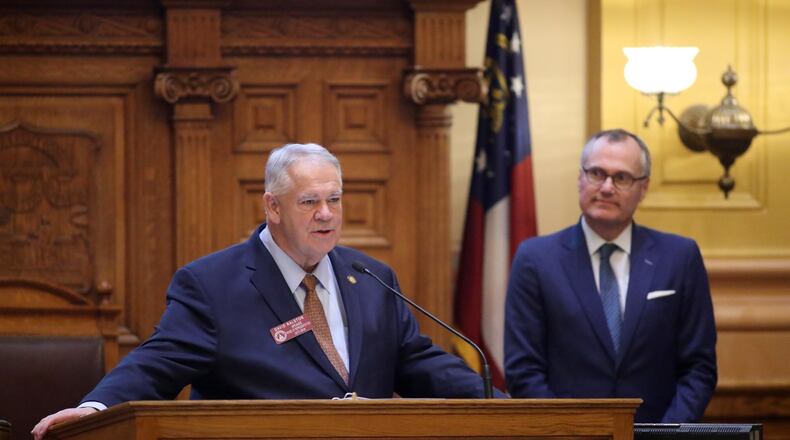Georgia House Speaker David Ralston delayed the end of this year's legislative session past a midnight deadline so lawmakers could vote on a bill to allow speeding ticket cameras in school zones.
The bill was pushed by Ralston's son, a lobbyist for an Arizona-based company, American Traffic Solutions, that sells the camera systems to local governments.
The legislation, House Bill 978, won final approval three minutes before state lawmakers went home for the year at 12:12 a.m. on March 30. The House voted 136-21 to pass the bill, sending it to Gov. Nathan Deal for his signature or veto.
Under the bill, police could mail speeding tickets to drivers who exceed the speed limit in a school zone by at least 10 miles per hour. Tickets would cost $75 for a first offense and $125 for subsequent violations, plus up to $25 in fees.
Ralston and Lt. Gov. Casey Cagle, the president of the state Senate, agreed to continue working past midnight to allow the House to approve the bill after it had passed the Senate a few minutes earlier, said Kaleb McMichen, a spokesman for Ralston, a Blue Ridge Republican.
“It was passed on the merits of the policy,” McMichen said. “If it had come over sooner, we would have taken it up sooner. … Folks who don’t agree with a certain policy or have grudges to bear are going to insinuate something else. That’s just the way it is.”
Critics such as William Perry, the executive director for Georgia Ethics Watchdogs, are unconvinced.
He said the bill would have been taken up much earlier in the legislative session if it deserved approval.
“I look at any bill that passes late on the last night as an attempt to avoid transparency,” said Perry, whose organization’s mission is to hold government officials accountable. “It’s just a circus when they’re pushing those bills through without any full consideration or without even a majority of the members even knowing what they’re voting on.”
But supporters of the bill said it will save children’s lives by encouraging drivers to be more careful.
State Sen. Brandon Beach, R-Alpharetta, said at least three people have been killed since the fall in crashes outside schools in Cobb, DeKalb and Fulton counties. Beach testified during a Feb. 21 committee meeting seated next to another lobbyist for American Traffic Solutions, Robb Willis, who works with Ralston's son, Matt.
“We have to look at this from a safety standpoint,” Beach said. “It would give people the opportunity to slow down in these school zones.”
Both Willis and Matt Ralston work for Troutman Sanders Strategies, which American Traffic Solutions hired to lobby for the bill.
“Everybody in this business has friends and relationships on both sides of the political aisle and in both chambers,” Matt Ralston wrote in an email. “Our goal is to advocate for our clients and for good public policy. Legislation should always pass or fail on its merits, and we believe this bill is good public policy.”
Legislators opposing the bill said they’re concerned about government surveillance of students and parents. They also said they fear the state is setting a precedent for potentially using speeding cameras in other areas, beyond school zones.
"I had concerns about increasing surveillance of children," said state Rep. Renitta Shannon, D-Decatur, who didn't know Ralston's son was a lobbyist for the bill. "There's a lot of bills we saw in the Legislature where there's more and more increasing privacy concerns."
American Traffic Solutions didn’t respond to a request for comment.
The company, which says on its website it has more than 3,200 safety cameras installed nationwide, has contributed at least $60,000 to Georgia legislators since 2012, according to campaign finance reports.
Those contributions include $6,700 to Ralston and $8,600 to Cagle since September. Ralston is running for re-election to the state House, and Cagle is running for governor.
The speeding camera bill was the second-to-last measure passed by the Georgia General Assembly before it adjourned.
The final bill approved by the House created the Center for Rural Prosperity, a university-run organization to promote rural businesses. That measure, House Bill 951, is budgeted to cost $1.7 million next fiscal year and was also a priority for Ralston.
In addition, the House voted at 12:01 a.m. on a bill to ensure insurance agents receive a commission when they sell health coverage. The legislation, House Bill 64, was backed by state Rep. John Meadows, R-Calhoun, an insurance agent and the powerful chairman of the House Rules Committee.
About the Author
Keep Reading
The Latest
Featured






